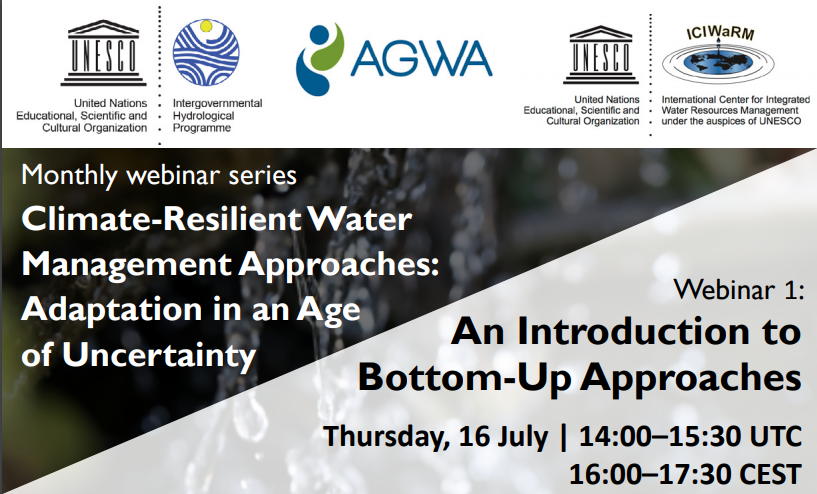ICIWaRM, UNESCO and AGWA Launch Webinar Series on Climate-Resilient Water Management Approaches
Over the past ten-plus years, various organizations have developed a set of complementary resilient water management tools and approaches that work to address climate risks and other uncertainties in a manner that can be integrated within existing planning, design, and operational decision processes. These “bottom-up approaches” differ from the original paradigm guiding water management for the past half-century — namely the assumption that we can use past hydrological and climatic data to confidently predict (and plan for) the future.

ICIWaRM, UNESCO’s Division of Water Sciences and the Alliance for Global Water Adaptation (AGWA) have organized a series of webinars introducing the technical and practical components of bottom-up approaches, spanning a range of topics and underscored by examples of real-world applications. The series is designed to lead up to a global conference on Climate-Resilient Water Management Approaches being organized by the same institutions and tentatively set for late 2020. The webinars are intended for technical water management professionals as well as individuals working in climate / water policy and planning.
The first webinar in the series, “An Introduction to Bottom-Up Approaches”, was held on Thursday, 16 July and hosted by UNESCO. About 230 people participated. Following introductory remarks from representatives of UNESCO, the Government of Flanders and ICIWaRM, three presentations were given. These were:
Bottom-Up Approaches: What, Why, and How? (John Matthews, AGWA),
Building Urban Flood Risk Resilience Under Deep Uncertainty: A CRIDA Case Study in Udon Thani, Thailand (Guillermo Mendoza, ICIWaRM), and
Resilience by Design in CDMX and the Valle de México (Sarah Freeman, University of Massachusetts-Amherst)
The presentations and a discussion session at the end were moderated by Anil Mishra of UNESCO.
